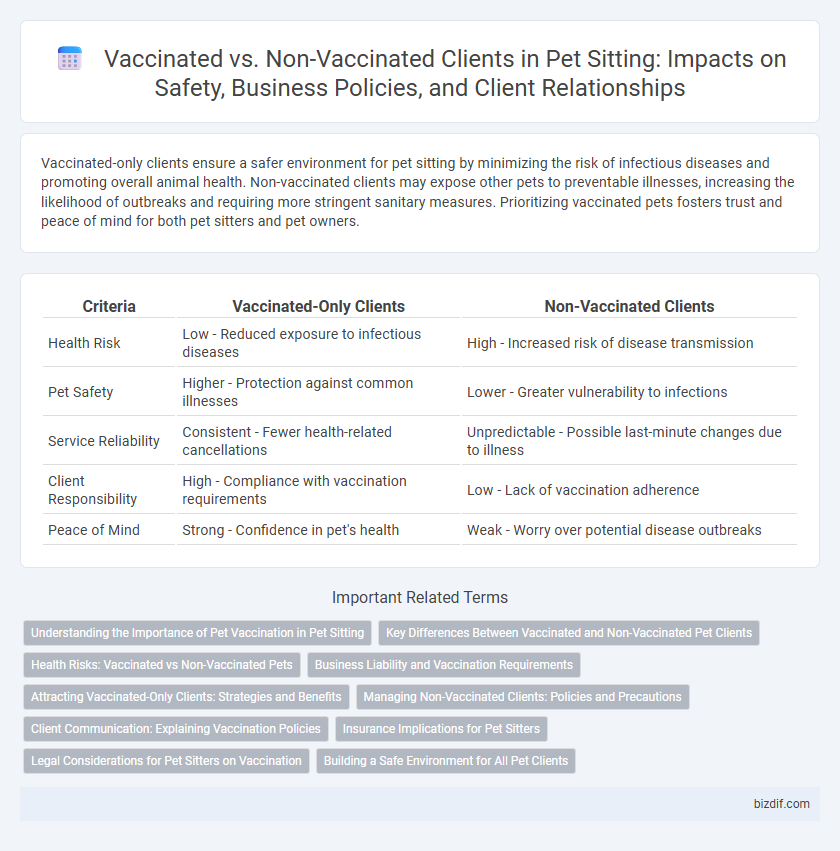Vaccinated-only clients ensure a safer environment for pet sitting by minimizing the risk of infectious diseases and promoting overall animal health. Non-vaccinated clients may expose other pets to preventable illnesses, increasing the likelihood of outbreaks and requiring more stringent sanitary measures. Prioritizing vaccinated pets fosters trust and peace of mind for both pet sitters and pet owners.
Table of Comparison
| Criteria | Vaccinated-Only Clients | Non-Vaccinated Clients |
|---|---|---|
| Health Risk | Low - Reduced exposure to infectious diseases | High - Increased risk of disease transmission |
| Pet Safety | Higher - Protection against common illnesses | Lower - Greater vulnerability to infections |
| Service Reliability | Consistent - Fewer health-related cancellations | Unpredictable - Possible last-minute changes due to illness |
| Client Responsibility | High - Compliance with vaccination requirements | Low - Lack of vaccination adherence |
| Peace of Mind | Strong - Confidence in pet's health | Weak - Worry over potential disease outbreaks |
Understanding the Importance of Pet Vaccination in Pet Sitting
Pet vaccination plays a crucial role in pet sitting by preventing the spread of contagious diseases such as parvovirus, kennel cough, and rabies within multi-pet environments. Vaccinated-only clients ensure a safer setting for both pets and sitters, reducing health risks and potential liability issues associated with unvaccinated animals. Prioritizing vaccination status promotes responsible pet care and fosters trust between pet sitters and pet owners.
Key Differences Between Vaccinated and Non-Vaccinated Pet Clients
Vaccinated pet clients typically benefit from reduced risk of contagious diseases such as rabies, distemper, and parvovirus during pet sitting, which increases overall safety and peace of mind for pet sitters. Non-vaccinated clients may require enhanced precautions and isolation protocols to prevent potential infection transmission to other animals, increasing the complexity and responsibility of care. Compliance with vaccination schedules often aligns with local health regulations, affecting pet sitters' liability and insurance coverage.
Health Risks: Vaccinated vs Non-Vaccinated Pets
Vaccinated pets significantly reduce the risk of transmitting contagious diseases such as parvovirus, distemper, and rabies during pet sitting engagements. Non-vaccinated pets are more susceptible to infections, increasing health risks for other animals and requiring extra precautions to prevent outbreaks. Pet sitters often prioritize vaccinated clients to ensure a safer environment and minimize potential health complications.
Business Liability and Vaccination Requirements
Pet sitting businesses accepting vaccinated-only clients reduce liability risks associated with contagious diseases, ensuring compliance with vaccination requirements that protect both pets and sitters. Implementing strict vaccination policies helps mitigate legal exposure by minimizing potential outbreaks and client disputes over health safety standards. Clear communication of these vaccination mandates enhances trust and reinforces professional responsibility within pet care services.
Attracting Vaccinated-Only Clients: Strategies and Benefits
Targeting vaccinated-only clients in pet sitting increases trust and safety, appealing to pet owners prioritizing health-conscious care environments. Highlighting strict vaccination policies through clear communication, social media, and testimonials attracts these clients who value disease prevention. Offering exclusive services or insurances tailored for vaccinated pets further enhances client confidence and loyalty.
Managing Non-Vaccinated Clients: Policies and Precautions
Establishing clear policies for managing non-vaccinated clients is essential to ensure the health and safety of pets and pet sitters. Implementing precautionary measures such as requiring updated health records, conducting additional sanitation protocols, and scheduling separate appointments can minimize disease transmission risks. Transparent communication about these policies builds trust with non-vaccinated clients while maintaining professional standards.
Client Communication: Explaining Vaccination Policies
Clear communication about vaccination policies fosters trust between pet sitters and clients, emphasizing health and safety priorities. Explaining the benefits of vaccinated-only services, including reduced risk of disease transmission, reassures clients about their pets' wellbeing. Providing transparent information and addressing client concerns ensures mutual understanding and strengthens professional relationships.
Insurance Implications for Pet Sitters
Pet sitters working with vaccinated-only clients benefit from lower insurance premiums and reduced liability risks, as vaccinated pets decrease the chances of disease transmission and related claims. Insurance providers often require proof of vaccination to offer comprehensive coverage, making compliance critical for pet sitters seeking protection against potential lawsuits or health-related incidents. Non-vaccinated clients may lead to higher premiums, limited policy options, or outright denial of coverage, exposing pet sitters to increased financial and legal vulnerabilities.
Legal Considerations for Pet Sitters on Vaccination
Pet sitters must carefully navigate legal considerations regarding vaccinated-only clients versus non-vaccinated clients, as local regulations often mandate specific vaccination requirements to protect animal and public health. Ensuring compliance with vaccination laws mitigates liability risks, especially in jurisdictions with stringent pet vaccination mandates. Maintaining clear contracts that specify vaccination prerequisites safeguards pet sitters legally and promotes responsible pet care practices.
Building a Safe Environment for All Pet Clients
Vaccinated-only clients ensure a reduced risk of disease transmission, promoting a healthier environment for all pets under care. Implementing strict vaccination policies protects vulnerable animals and reassures pet owners about the safety of the facility. Maintaining updated vaccination records and encouraging compliance fosters trust and well-being across the pet community.
Vaccinated-only clients vs Non-vaccinated clients Infographic

 bizdif.com
bizdif.com